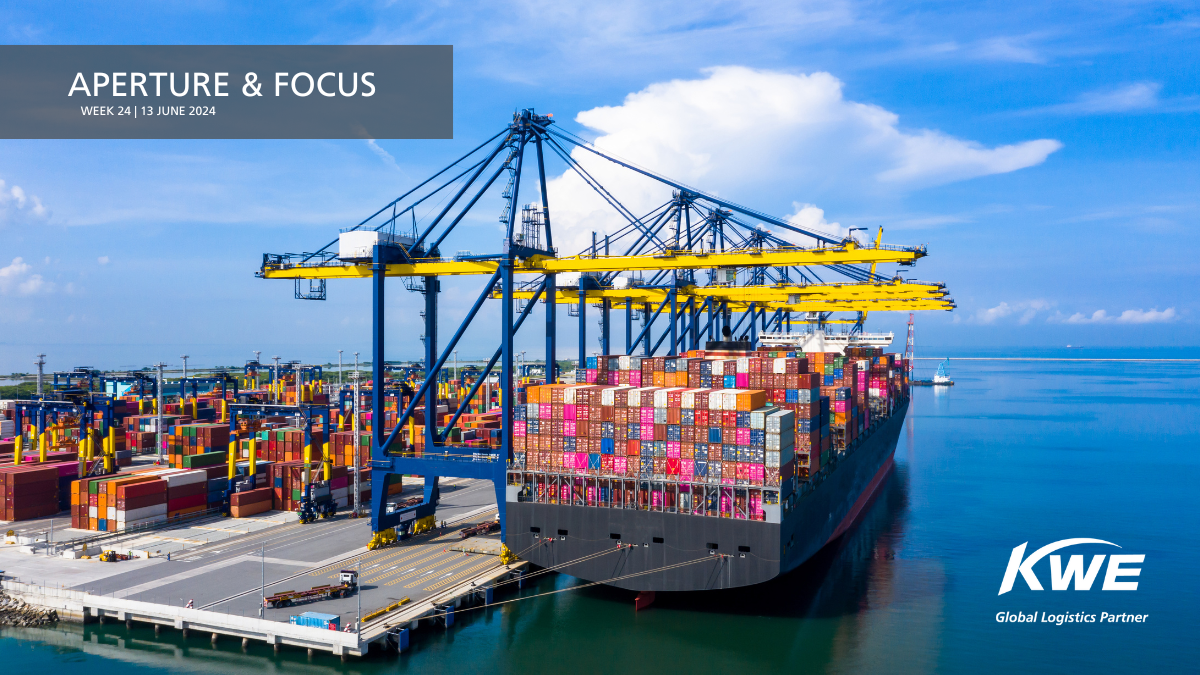Quote
Aperture & Focus 2024: Week 24

Global Aperture
China's ocean container exports to Mexico have spurred growth in the border city of Laredo, Texas, U.S. as Chinese goods increasingly enter the U.S. via this port of entry. The surge in cross-border freight from Mexico to the U.S. has led to a boom in Laredo, causing significant increases in import container volumes and demand for warehouse space.
Rising ocean freight rates are causing significant concern, with some forecasts predicting that costs could remain high through early 2025. Factors contributing to this increase include longer transit routes, capacity shortages, and canceled sailings from Asia, all of which are exacerbating supply chain challenges and potentially impacting consumer prices for key products like electronics. Additionally, air freight spot rates have surged due to high e-commerce demand and disruptions in ocean container services, highlighting the sensitivity of air freight to changes in global shipping dynamics.
Regional Focus
Americas
United States: Negotiations between the International Longshoremen’s Association (ILA) and United States Maritime Alliance (USMX) have been suspended due to allegations of unauthorized automation at port of Mobile, Alabama, and possibly other ports. With the ILA's current contract expiring on September 30, a strike could occur in October, causing significant disruption to East Coast and Gulf Coast port operations.
Mexico: The expansion of air cargo operations in Mexico, particularly in Monterrey and Guadalajara, aims to handle the rising cross-border trade between Mexico and the US. Lufthansa Cargo and other carriers are expanding their operations in Mexico by adding weekly flights to Felipe (AIFA), the designated freighter gateway for the nation’s capital. Notably, Mexico's international air cargo volume rose by 5.4% year on year in the first quarter to 206,792 tons. This shift is driven by nearshoring trends and congestion at Mexico City International Airport which has positioned secondary airports as critical hubs for international cargo traffic.
Canada: The potential rail strike in Canada has prompted shipping lines to cancel calls into Vancouver and Prince Rupert, the country's main pacific gateways. Carriers are taking preemptive measures, including omitting, blanking, or swapping calls, with numerous port swaps and diversions to US gateway ports.
Asia-Pacific
Bangladesh: The Patenga Container Terminal (PCT) in Chittagong commenced operations on June 10th. This terminal aims to enhance Chittagong port's container handling capacity by 500,000 cargo containers, with the goal of alleviating congestion and improving efficiency.
China: A Memorandum of Understanding (MoU) has been signed on June 8th between major Malaysian airport management, Malaysia Airports Holdings Berhad (MAHB), and prominent aviation group from China, China Henan Aviation Group Co., Ltd (CHAGC) that aims to bolster air cargo connectivity between Malaysia and China. Starting June 21st, the agreement will expand direct air routes between Zhengzhou Xinzheng International Airport (CGO) and Kuala Lumpur International Airport (KUL), improve transshipment infrastructure, and further support Malaysia’s strategic logistics initiatives to contribute to its regional connectivity.
Europe, Middle East & Africa
France: Operations at major ports such as Le Havre and Marseille-Fos face disruption due to planned strikes by labor unions representing dockers and other port workers. The strikes, sparked by protests over pension reforms and increased retirement age, have already led to cancellations and delays in ship calls, with further industrial action anticipated throughout June.
Belgium: Authorities at the port of Antwerp have taken measures to contain an oil spill resulting from a ship bunkering incident on June 7th, which led to the closure of the Deurganck Dock and the Kieldrecht lock, the largest lock in the world by water volume. The closure of the dock and lock, ship cleaning, and oil containment efforts are causing delays in vessel departures and arrivals, leading to congestion at alternative port facilities.